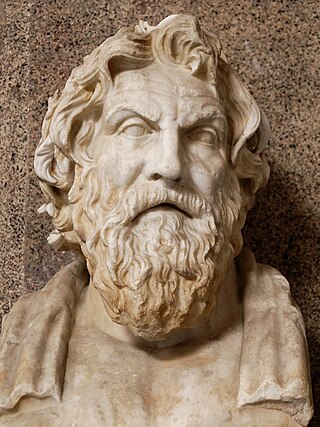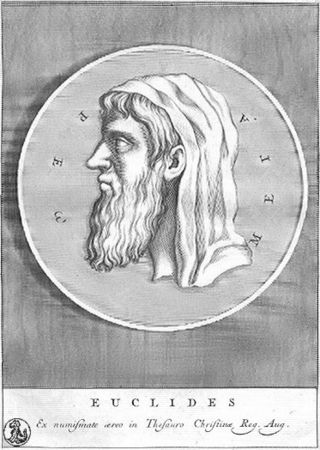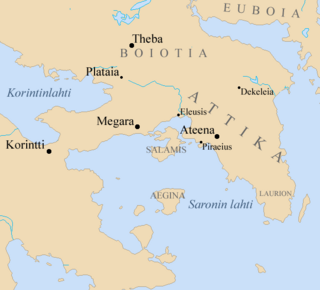
Eubulides of Miletus was a philosopher of the Megarian school who is famous for his paradoxes.
Diogenes Laërtius was a biographer of the Greek philosophers. Little is definitively known about his life, but his surviving Lives and Opinions of Eminent Philosophers is a principal source for the history of ancient Greek philosophy. His reputation is controversial among scholars because he often repeats information from his sources without critically evaluating it. He also frequently focuses on trivial or insignificant details of his subjects' lives while ignoring important details of their philosophical teachings and he sometimes fails to distinguish between earlier and later teachings of specific philosophical schools. However, unlike many other ancient secondary sources, Diogenes Laërtius generally reports philosophical teachings without attempting to reinterpret or expand on them, which means his accounts are often closer to the primary sources. Due to the loss of so many of the primary sources on which Diogenes relied, his work has become the foremost surviving source on the history of Greek philosophy.

Antisthenes was a Greek philosopher and a pupil of Socrates. Antisthenes first learned rhetoric under Gorgias before becoming an ardent disciple of Socrates. He adopted and developed the ethical side of Socrates' teachings, advocating an ascetic life lived in accordance with virtue. Later writers regarded him as the founder of Cynic philosophy.

Pyrrho of Elis was a Greek philosopher of Classical antiquity, credited as being the first Greek skeptic philosopher and founder of Pyrrhonism.
Menedemus of Eretria was a Greek philosopher and founder of the Eretrian school. He learned philosophy first in Athens, and then, with his friend Asclepiades, he subsequently studied under Stilpo and Phaedo of Elis. Nothing survives of his philosophical views apart from a few scattered remarks recorded by later writers.

Euclid of Megara was a Greek Socratic philosopher who founded the Megarian school of philosophy. He was a pupil of Socrates in the late 5th century BC, and was present at his death. He held the supreme good to be one, eternal and unchangeable, and denied the existence of anything contrary to the good. Editors and translators in the Middle Ages often confused him with Euclid of Alexandria when discussing the latter's Elements.

Timon of Phlius was an Ancient Greek philosopher from the Hellenistic period, who was the student of Pyrrho. Unlike Pyrrho, who wrote nothing, Timon wrote satirical philosophical poetry called Silloi (Σίλλοι) as well as a number of prose writings. These have been lost, but the fragments quoted in later authors allow a rough outline of his philosophy to be reconstructed.

The Megarian school of philosophy, which flourished in the 4th century BC, was founded by Euclides of Megara, one of the pupils of Socrates. Its ethical teachings were derived from Socrates, recognizing a single good, which was apparently combined with the Eleatic doctrine of Unity. Some of Euclides' successors developed logic to such an extent that they became a separate school, known as the Dialectical school. Their work on modal logic, logical conditionals, and propositional logic played an important role in the development of logic in antiquity.
Phaedo of Elis was a Greek philosopher. A native of Elis, he was captured in war as a boy and sold into slavery. He subsequently came into contact with Socrates at Athens, who warmly received him and had him freed. He was present at the death of Socrates, and Plato named one of his dialogues Phaedo.
Hermotimus of Clazomenae, was a possibly historic or legendary Presocratic philosopher about whom many legendary feats were ascribed in antiquity, including the ability for his soul to leave his body and travel around. Some ancient sources also considered him a previous reincarnation of Pythagoras. Aristotle also credited him with some of the metaphysical doctrines on Nous that were more commonly attributed to Anaxagoras.
Plato was an ancient Greek philosopher, the second of the trio of ancient Greeks including Socrates and Aristotle said to have laid the philosophical foundations of Western culture.
Glaucon, son of Ariston, was an ancient Athenian and Plato's older brother. He is primarily known as a major conversant with Socrates in the Republic. According to Debra Nails, two major facts about Glaucon's life can be ascertained from a single comment by Socrates in the Republic, that Glaucon was old enough to have distinguished himself in a battle at Megara, and that he was the eromenos of the poet and statesman Critias. In Book V of the Republic, an exchange between Socrates and Glaucon indicates that Glaucon owned property where he kept and bred sporting dogs and game birds.
Theodorus "the Atheist", of Cyrene, was a Greek philosopher of the Cyrenaic school. He lived in both Greece and Alexandria, before ending his days in his native city of Cyrene. As a Cyrenaic philosopher, he taught that the goal of life was to obtain joy and avoid grief, and that the former resulted from knowledge, and the latter from ignorance. However, his principal claim to fame was his alleged atheism. He was usually designated by ancient writers ho atheos, "the atheist."
Euphantus of Olynthus was a philosopher of the Megarian school as well as a historian and tragic poet. He was the disciple of Eubulides of Miletus, and the instructor of Antigonus II Gonatas king of Macedonia. He wrote many tragedies, which were well received at the games. He also wrote a very highly esteemed work, On Kingship, addressed to Antigonus, and a history of his own times. He lived to a great age.
Philo the Dialectician was a Greek philosopher of the Megarian (Dialectical) school. He is sometimes called Philo of Megara although the city of his birth is unknown. He is most famous for the debate he had with his teacher Diodorus Cronus concerning the idea of the possible and the criteria of the truth of conditional statements.
Clinomachus, was a Megarian philosopher from Thurii, Magna Graecia. He is said by Diogenes Laërtius to have been the first who composed treatises on the fundamental principles of dialectics, and is described as the founder of the Dialectical school. According to the Suda, he was the disciple of Euclid of Megara, and he taught Bryson, the teacher of Pyrrho. He thus lived towards the earlier half of the 4th century BC.
Nicarete or Nicareta of Megara was a philosopher of the Megarian school, who flourished around 300 BC. She is stated by Athenaeus to have been a hetaera of good family and education, and to have been a disciple of Stilpo. Diogenes Laërtius states that she was Stilpo's mistress, though he had a wife.
Asclepiades of Phlius was a Greek philosopher in the Eretrian school of philosophy. He was the friend of Menedemus of Eretria, and they both went to live in Megara and studied under Stilpo, before sailing to Elis to join Phaedo's school. His friendship with Menedemus was said to have been hardly inferior to the friendship of Pylades and Orestes. As impoverished young men living in Athens, they were one day summoned before the Areopagus, to explain how they could spend all day with the philosophers if they had no visible means of support. They summoned a miller to the court to explain that they threshed grain at night for 2 drachmas, whereupon the Areopagites were so astonished that they awarded the two men 200 drachmas as a reward.
Thrasymachus of Corinth, was a philosopher of the Megarian school. Little is known about him except that he was colleague and friend of Ichthyas, and he had presumably been taught by Euclid of Megara, the founder of the school. He was said to have been the teacher of Stilpo.
Pasicles of Thebes was a Greek philosopher and brother of the Cynic philosopher Crates of Thebes. He attended the lectures of his brother Crates, but he is otherwise connected with the Megarian school of philosophy, because Diogenes Laërtius calls him a pupil of Euclid of Megara, and the Suda calls him a pupil of an unknown "Dioclides the Megarian." Pasicles is said to have been the teacher of Stilpo, who became leader of the Megarian school. Thus we have the implausible situation of Pasicles teaching Stilpo, Stilpo teaching Crates, and Crates teaching Pasicles. Crates named his son Pasicles.




